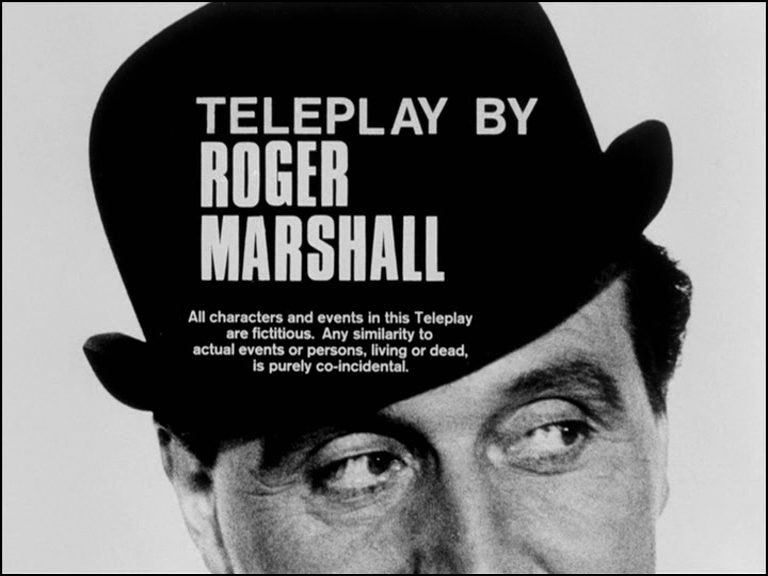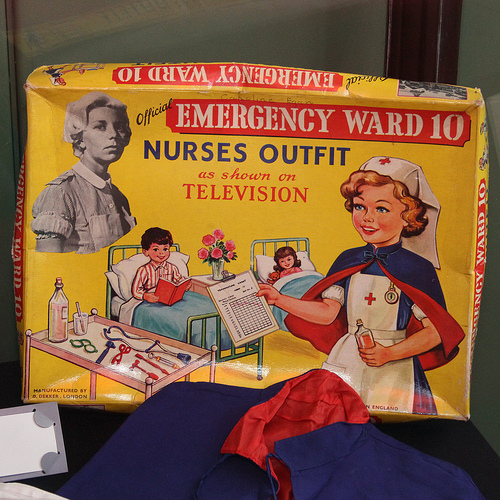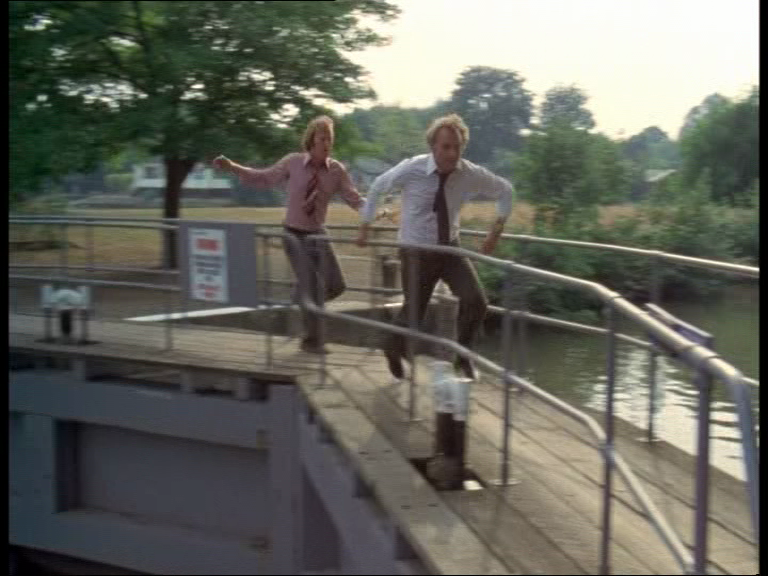Last February, I had the good fortune to interview one of the great screenwriters of British TV drama, Roger Marshall in his Richmond home. His extensive C.V. has included episodes of The Avengers, The Sweeney, The Professionals, two plays for Armchair Theatre, the serials Missing from Home, Traveling Man and Floodtide. He was also the creator of three series: Zodiac, Mitch and (with Anthony Marriot) Public Eye. In the final part of the interview, he discussed the early days of his screenwriting career in Hollywood and writing for Euston Films in the 1970s.
BS. I think that it’s true of many series of the sixties and seventies that they had a set number of three or four directors for a 13-part series. It seems to make a series feel more consistent when it had a fixed number of directors.
RM. Yes, if you’re doing 13 episodes and you’ve got 13 directors it would be ludicrous, wouldn’t it? Directors have a style, that’s absolutely true. When The Avengers started, long before I joined it, there were just two directors doing alternative episodes, and making bricks with absolutely no straw at all. Junk! But they still made it look good.
BS. You wrote for The Avengers in the film period, did you also write for the studio ones?
RM. Yes, I did both. The old tape ones, the studio ones with Honor Blackman, they had a lot of merit. When it went on to have all the advantages of film and Diana Rigg, etc, not everything was an improvement, I think. To start with, the idea was no longer fresh or novel. I can remember I was once in America and the family I lived with wrote to me when The Avengers was on, “It’s lovely to see your name, we love her but he’s far too old.” He’s still doing it now, fifty years later! American standards, American thoughts…
BS. I was interested to learn that you worked in American television when you were in your twenties before moving back to Britain.
RM. Yes. I was too young and too inexperienced to get the maximum benefit out of it. But it was at a time where if you wanted to work in film television in England everything had to be beholden to the Americans. So it seemed that the easiest thing to do was to go and get some experience there. Tough. It was probably useful in the end.
BS. Was the set-up of American television very different to how British television worked?
RM. Well, not that different. It was a producer working for a company. The ones that did Sea Hunt (Ziv Television Programs, 1958-61) were a company where I had a story editor I had met because he’d been working in England on a Harry Alan Towers thing called Dial 999 (ABC, 1958-59) which was pretty grim. But at least I’d got a good relationship with this story editor and he said, come over and try your luck with us, I’ll help. So I lived with his family for a while and it was one of those things that were probably more beneficial to be able to say over here that you’d been there, rather than to be asked, “What did you learn? Tell me ten things.” I can’t! But “You worked in Hollywood! Did you die?” “No, I managed to get the odd job”, so it was a plus.
BS. It’s remarkable historically when I read about that period how many people working in British television were Canadian.
RM. Well, Canada was the great place at that time, certainly. Everybody who was hitting the gong at Thames was from Canada. There was Sydney Newman, then his replacement Lloyd Shirley, and there were numerous directors working there who had worked for CBC. There’s a show on now on Sky, Law & Order, and one of the segments on that is produced by a guy who’s name I remember from Armchair Theatre (ABC/Thames, 1956-74). He must be as old as me, plus another ten years. They must have to wheel him in to the studio. Still, he’s still earning his corn.
BS. Something that’s striking about your career when you started in British television in the late fifties is that you seemed to work in both studio series like Emergency Ward Ten (ATV, 1957-67) as well as filmed adventure series such as William Tell (ITC, 1958-59).
RM. That was Lew Grade, at the bottom of the scale. The reason for that was that I started with a film company in Elstree, ABC, and my wife was then the secretary to a producer, Gordon Scott – a talentless Scot, of whom there were a lot – and he was a bit of a pig to work for, so she moved across the road to national as it was then to work for a producer, and it was really she who got me over from my little office in Elstree to working on William Tell. That led to The Invisible Man (ITP, 1958-59) and all of the things that they were making at the time.
BS. So were you working on Emergency Ward Ten and the adventure series simultaneously?
RM. Emergency Ward Ten came some years later. I’m positive about that because it was made in the same studios as William Tell, by which time that era had moved on and out. I worked on Ward Ten because I was asked to do so and it was a batch of steady work. I may have done as many as twenty episodes, it seemed rather a lot.
While I was doing that I started to work on The Avengers. Then The Avengers offered me a contract to do three episodes on the condition that I stopped writing Ward Ten. Not that they had any obvious objection to Ward Ten, they knew I couldn’t do both at the same time. They were right, so I left.
BS. Soap writing does seem to have been a treadmill for writers. Not so much Coronation Street (Granada, 1960-) , but Crossroads (ATV, 1964-88) in particular.
RM. Crossroads was the depths.
BS. For professional reasons, I’ve been watching the surviving episodes in sequence, one a day. It’s interesting to see television drama of that period being achieved at a rudimentary level, and understanding the circumstances that made it so difficult to produce.
RM. I think that the scuttlebutt on Crossroads is that the head of the studio’s mistress was in the lead and that kept it going for no good reason. It was pretty rubbishy. I don’t think that anybody… I mean if you go back through the annals of Ward Ten you’ll find some amazing actors working in it – Albert Finney. Well, I don’t think that you’ll find an Albert Finney in Crossroads.
BS. The final thing that I’d like to ask about is Euston Films, because they had such a distinctive house style. Were they different to write for than other film series? I’m thinking of The Sweeney (Thames, 1974-78) in particular, but you can already see it starting in Special Branch (Thames, 1969-74).
RM. Yes, it just got so much better in The Sweeney than Special Branch. The material was better, the actors were better – I can’t remember now who was in Special Branch.
BS. George Sewell and Patrick Mower.
RM. Well, that says it all. When you’re working with John Thaw, then you’re working with the best. I think The Sweeney was great success because the crew were all film people, and they were all used to six weeks’ work/ six months out of work, and suddenly to get a solid block of work was exciting for all of them and they didn’t mind the fact it was midnight and they should be getting overtime. They were so keen and that spirit went right the way through, so for the four seasons that it was on it was very exciting television.
BS. It feels like guerilla filmmaking to me, just in finding these very real locations that you hadn’t seen before in those ITC series.
RM. Well, ITC just wasn’t real, was it? I mean, its very nice Roger Moore looking in the screen and smiling, but the acting level was way down. There was intensity with John and Dennis, which was great. I can remember seeing one particular episode with George Sweeney in (‘Taste of Fear’, 4 October 1976), and there were one or two scenes that David Wicks got him to do, and I was quite frightened, frankly. I remember saying to my wife, “Jesus Christ, if the IRA are watching this, our days are numbered!” Somebody fired a blank in the office, and the staff were all “Jesus Christ, I’m dead!” There was an excitement, which you don’t often get.
BS. The Sweeney is so extraordinarily diverse when you watch it in sequence, as well. It has this reputation in popular culture as what Tony Garnett called a ‘squealing tyres’ show, but when you see the episodes there’s a strong dialectic about the value of policing and what they should do.
RM. Yes. It was amazing. Because I can remember a review of one I wrote towards the end, and it said that it had a heavy left-wing bias – coming from me, that’s good! I couldn’t get arrested at the BBC. There was one famous occasion when somebody suggested me for a Play for Today (BBC, 1970-84) at the BBC and the answer came back, “We can’t use him, because he’s not political”
BS. Thank you, Ken Trodd!
RM. Thank you very much. Don’t call me. One-off plays, well they’re a thing of the past, aren’t they? Gone, sadly.
BS. You did a couple of Armchair Theatres.
RM. Yes, with John Thaw, funnily enough, which was a museum piece because he’s married to somebody in the play and they’ve got two children. And the two children who appear on the OB are our two children, both of them giving incredibly awful performances – at one point he seems to be obsessed with sniffing his thumb, which detracts from his acting, but John was his usual self, except he looks a bit young in it now. That was called Whatever Became of Me? which was a sort of phrase that you start to think of in your forties.







What an interesting interview! Ok, so, here are some of my views, exclusively as a viewer (as I have never worked in television, film or stage). Firstly, I missed the early Avengers series, starring Honor Blackman. So, I joined, as a viewer, when Diana Rigg was the female lead. I would have been about oh, 7-8 or 9 at the time, in the mid-sixties. And she was definitely a pin-up, sex-symbol for a lot of us young boys (almost certainly for some girls too), with her skin-tight leather outfits etc! But also, she looked like she could handle herself (‘though I have to say that her martial art moves didn’t look particularly professional!). I always liked ol’ Steed too. He was a very cool customer, never (or very rarely anyway) flustered. I, personally, still rate them one of the best male-female special agent-type teams I’ve ever seen on television, and I’ve watched many thousands of hours of it over the years. I jus thought they gelled so well, ‘though I must admit I went off the stories as the years went by; I just found them too far out… oh, ok, plain silly (for my own personal tastes!). I’ve already made some comments about Public Eye on this web site, but suffice to say on here, I am a fan of the series, mainly because of the Frank Marker character, himself, whom I find immensely engaging. As for Crossroads; well, I as child, I enjoyed it enough, essentially as a very simple week-to-week, simple storyline series – a typical soap really, ‘though I agree with RM, it’s nowhere near on the same level of quality of writing, acting, and production as Coronation Street, which incidentally I have never been a huge fan of. Soaps are not really my kind of drama. As for The Sweeney and Special Branch; yes John Thaw was superb and gelled well with Dennis Waterman. But I would never rate DW a better actor than George Sewell, nor for that matter than Patrick Mower. I vaguely recall the Armchair Theatre plays being on, but none specifically. However, I do miss the minimal amount of music used up until about the early 198os'(?), as the absence of it (for me) contributes to the dramatic atmosphere. Whereas, today I think there is just far to much music used in tv drama. I think film is different in that respect. Again, these are simply my personal view points.